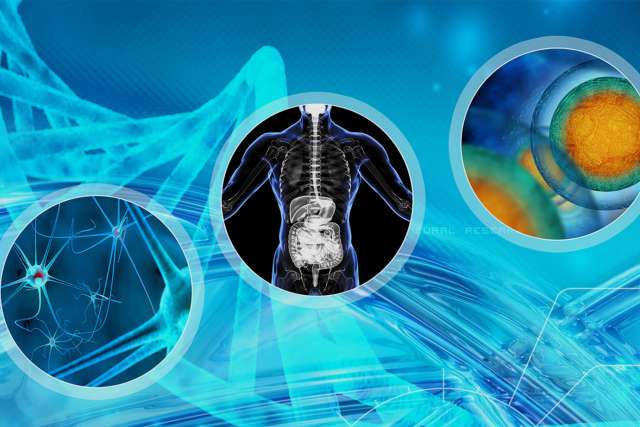Digestive Diseases Research

Conducting groundbreaking studies
Research has been a mainstay of our division since it was established in 1953, and we have grown to become a world leader in contributing new digestive diseases-related knowledge through scientific studies. We have recently launched the Goodman-Luskin Microbiome Center and the Comprehensive Liver Research Center.
Our research strengths
Our faculty publish extensively and play prominent roles in national meetings, advancing the state of the science and ushering in cutting-edge treatments that improve and save lives.


Research centers and labs
Our division’s investigators study novel therapeutics and perform cutting-edge research. We also continue to collaborate across our UCLA Health system, the David Geffen School of Medicine at UCLA, and multiple campus units.
Research news

One in four transplant hepatologists shows signs of unhealthy alcohol use, new survey finds
Dr. Arpan A. Patel said the findings underscore the need to create systemic support structures to encourage hepatologists to reduce their alcohol intake. Among the recommendations in the study: normalizing access to physician wellness and treatment programs; confidential access to counseling and alcohol use disorder treatments; and reducing stigma about attending state physician health wellness programs, which Patel said have shown success.

Kids with autism show altered gut microbiome-brain interactions
A collaborative study by scientists from UCLA and USC may have unlocked new information about autism spectrum disorder (ASD) and the gut microbiome. Changes in the relative amounts of such metabolites may interfere with the signaling between the gut and brain, influencing emotions and associated behaviors.

Chronic stress and obesity work together to accelerate pancreatic cancer development and growth
A new study led by UCLA investigators suggests that chronic stress and an unhealthy diet may work together to fuel the early development of pancreatic cancer, shedding light on how lifestyle factors contribute to one of the deadliest malignancies.

$3M NIH grant to improve follow-up care for colorectal cancer screening in underserved populations
The new study will focus on increasing follow-up care for underserved patients who receive abnormal results from stool-based fecal immunochemical tests (FIT).

$9.5M grant to study relationship between polyphenol intake, Alzheimer’s prevention & brain-gut-microbiome system
Polyphenols — a key component of Mediterranean diets and found in berries, grapes, green tea, and cocoa — may delay cognitive decline.

UCLA researchers tackle challenges in Barrett’s esophagus (BE) diagnosis and management
Drs. V. Raman Muthusamy and Jennifer Kolb are conducting research addressing issues that include which patients to screen, how to identify the condition in a more timely manner, and how to better predict which patients found to have BE will progress to esophageal cancer and thus should be treated immediately with endoscopic eradication techniques.

UCLA Health is the only institution awarded two NIH SCORE grants
Science is still ignoring women's health, but UCLA Health researchers are fixing that. “Men and women could have different disease pathogenesis, different risk levels and different responses to treatments,” said Lin Chang, MD, co-principal investigator. “You really have to consider sex as a biological variable.”

Feeding the lonely brain
A new UCLA Health study has found that women who perceive themselves to be lonely exhibited activity in regions of the brain associated with cravings and motivation towards eating especially when shown pictures of high calorie foods such as sugary foods. The same group of women also had unhealthy eating behaviors and poor mental health.
